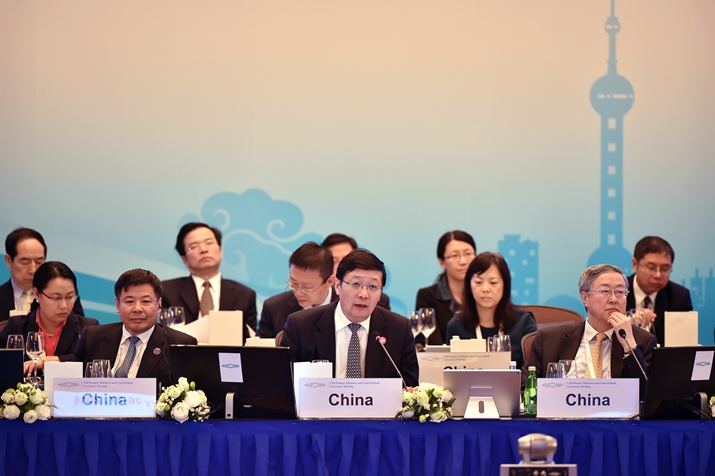Creating a strong G20
- By Xu Hongcai
 0 Comment(s)
0 Comment(s) Print
Print E-mail Beijing Review, April 21, 2016
E-mail Beijing Review, April 21, 2016
|
|
|
Chinese Finance Minister Lou Jiwei delivers a speech at the opening of the first Meeting of G20 Finance Ministers and Central Bank Governors in Shanghai on February 26 [Xinhua] |
China should seize the moment at the Group of 20 (G20) Summit in Hangzhou, capital of Zhejiang Province, in September to inject vitality into the organization and stimulate global governance.
The G20, as an important platform for world economic cooperation, once championed the role of tackling the 2008 financial crisis. Even so, it is currently beset by a raft of problems, such as a lack of authority and executive power.
Currently, due to the changes in the world economy, the G20's mission is transforming to one promoting the long-term sustainable development of the global economy.
The necessity
In my opinion, one of the most urgent and crucial issues is to establish a permanent secretariat for the G20 and to improve macroeconomic policy coordination among top global economies.
The G20 continues to play a significant role in global governance. On the basis of its past achievements, a reform within the organization would be the optimal choice to improve the coordination of global macroeconomic policy and to revitalize its relevance on a global scale.
The G20 serves as an international forum for the world's most prominent policymakers, including representatives from both developed countries and emerging economies. The combined population, land area, GDP, as well as total trade volume of its members account for a large proportion of the entire world, and therefore they exercise enormous economic influence.
For a long time, G20 meetings at all levels served as a platform for the exchange of information and policy communication, but its lack of executive force was a glaring flaw—without it, the forum is toothless. This would negatively affect the organization's authority and influence.
The main aspect of the G20 consists of gatherings hosted by the rotating presidency country, including summits as well as meetings of finance ministers and central bank governors. Other derivative forms include business meetings, think tank meetings, and more.
However, due to the fact that the topics and content covered in those conferences are mostly broad and diverse, it is extremely difficult to push forward coordination, especially considering the divergence of numerous parties' interests.
In recent years, some members of the G20 have called for the establishment of a permanent secretariat for the forum. The secretariat proposed would function as a standing body to organize and coordinate various tasks to be completed when the main meetings are adjourned.
A permanent secretariat could improve the effectiveness of communication and coordination between G20 members in terms of decision making and help supervise and push forward the implementation of resolutions. It could also help enhance collaboration between the G20 and other international organizations, as well as help steer the topics and themes of meetings away from any heavy influence from host countries.







Go to Forum >>0 Comment(s)